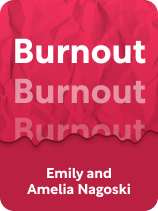

This article is an excerpt from the Shortform book guide to "Burnout" by Emily Nagoski and Amelia Nagoski. Shortform has the world's best summaries and analyses of books you should be reading.
Like this article? Sign up for a free trial here.
Why is rest important? What does proper rest do to our bodies?
In Burnout, Emily and Amelia Nagoski explain that women face burnout more often than men. To help prevent this burnout, they recommend getting proper rest to help you relax and stay more productive.
Let’s look at why rest is important and how much sleep you should be getting.
The Importance of Rest
The authors explain why rest is important: if we don’t get proper rest, we will run ourselves into the ground and inevitably face burnout. Rest is a time when we stop using the part of us that’s getting worn out so it can renew itself. Three main types of rest accomplish this purpose: daydreaming, switching tasks, and sleeping.
The authors explain that daydreaming is important because your brain is designed to switch back and forth between focused attention mode and rest mode (daydreaming). This oscillation allows you to reach peak productivity. If you start feeling overworked or burnt out, take a break from focused attention mode (the mode used when working) and do a menial task like washing dishes that allows your brain to wander. You’ll often gain new insights from this daydreaming that will spark your creativity.
But the authors explain that sometimes, your brains want to be in focused attention mode and that daydreaming can be too boring. When this happens, you can switch tasks so that you’re still using your brain, but using a different part of it. For example, if you feel burnt out from completing work tasks, take a break and do something that requires focus but is enjoyable, like painting or completing a puzzle.
Finally, the authors say that your body needs an average of eight hours of sleep per night to function properly. Sleep is the time when your body heals from the damage of the day, your brain grows and learns, and your emotions are processed and regulated. Not getting enough sleep can damage both your physical and mental health.
(Shortform note: The authors suggest that your body needs an average of eight hours of sleep every night to be fully rested and avoid damage to your health. However, experts explain that this number fluctuates based on factors like age, health, and energy level. For healthy adults between the ages of 18 and 64, seven to nine hours of sleep per night should be sufficient—the author’s recommendation of eight hours falls into this range. However, the amount of sleep we need decreases with age—newborns need a minimum of 14 hours while teenagers need eight to10, and older adults over 65 need only seven or eight hours of sleep. Experts add that people with health issues or jobs that are labor-intensive or high-stress may need to add an hour or two to these estimates to be sufficiently rested.)
The Two Modes of Thinking: Diffuse and Focused
In A Mind For Numbers, Barbara Oakley refers to these two modes of attention as “focused” and “diffuse.” Like the authors, Oakley explains that your brain is naturally designed to switch between these two modes and that doing so is how we reach peak productivity. However, she provides slightly more detail than the authors do by explaining what’s going on in your brain during each of these attention modes.
Focus-mode thinking is primarily associated with the left hemisphere of the brain. When you’re in this mode, your thoughts travel rapidly along short pathways that connect with other concepts in your mind that are closely related. Diffuse-mode thinking is primarily associated with the right hemisphere of the brain. In this mode, thoughts traverse longer neural pathways between more diverse concepts. Diffuse mode thinking allows you to subconsciously process information gathered during focus-mode thinking but in a different way. This is why it can provide us with new insights, as the authors explain, and help us solve problems that we might have been hung up on while in focus mode.

———End of Preview———
Like what you just read? Read the rest of the world's best book summary and analysis of Emily Nagoski and Amelia Nagoski's "Burnout" at Shortform.
Here's what you'll find in our full Burnout summary:
- Why women are more likely to suffer physical, mental, and emotional burnout in today's society
- How women can handle these stressors and thrive
- How to recover from burnout and get back on your feet






